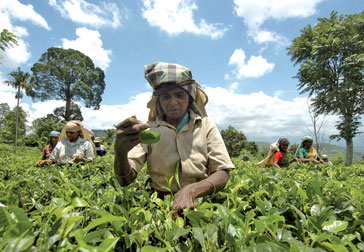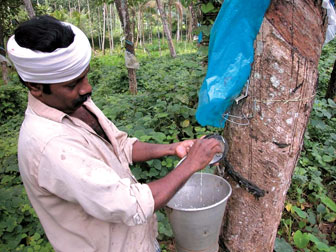‘Labour benefits should be productivity linked’
Plantation workers were given a substantial wage increase according
to the current cost-of-living in the country, said Chairman Planters’
Association, Lalith Obeysekera.
 |
|
Tea pluckers |
He said estate sector workers were offered the best deal considering
the cost-of-living in the country and added that the wage hike will have
a positive impact on the growth of the plantation industry.
Plantation workers have been agitating for a reasonable wage increase
considering the staggering cost-of-living which according to labour
unions has sky-rocketed making life difficult for estate sector workers.
Estate sector workers requested a Rs. 750 increase in the daily wage
of a worker but according to an agreement between regional plantation
companies and labour unions the basic wage was increased to Rs. 380 from
Rs. 285 and the total day’s wage to Rs. 515.
The JVP affiliated workers’ union and the All Ceylon Estate Workers’
Union (ACEWU) claim that the collective agreement on wages is not
acceptable and accused trade unions betraying the struggle of workers
for a decent wage increase.
A spokesman for ACEWU said that the wage increase is not beneficial
to workers who are unable to afford the rising cost-of-living and added
that certain trade unions have betrayed the might for a reasonable rise
in wages.
According to the collective agreement valid for two years the total
daily wage of a worker was increased from Rs. 405 to Rs. 515 with a
fixed price share supplement of Rs. 30 and an attendance bonus of Rs.
105. In addition to the wages, companies agreed to pay Rs. 17 per kilo
of tea leaves for pluckers exceeding the target.
Rubber tappers will be paid Rs. 25 per kilo of latex.
The productivity incentive in the agreement was replaced by the fixed
price share supplement.
 |
|
Rubber tapper |
Obeysekera said that with the new wage hike the cost of production
will increase by around Rs. 40 to Rs.50 per kilogram of tea, a 24
percent increase.
“A company will have to pay over Rs.10 billion on wages, EPF/ETF and
gratuity”, he said.
“Trade unions should consider the wage increase as the best offer for
workers and work towards the stability and growth of the plantation
industry”, Obeysekera said.
Twenty-two regional plantation companies employ around 240,000
workers of nearly one million estate sector population.
Chairman, HVA Group and Immediate Past President of the National
Chamber of Exporters Rohan Fernando said that plantation workers have
been given a reasonable wage increase and added that all incentives
should be linked to productivity.
“Productivity has to be enhanced for the benefit of the industry and
it is only then that workers will gain”, he said.
Returning from China following a business meeting, he said the
Chinese tea industry is growing at a rapid pace since employees are keen
to work hard for the benefit of the industry.
Fernando said the Sri Lankan tea export revenue will reach US$ 1.5
billion this year if the tensions in Iran and Libya eases.
LF
|

